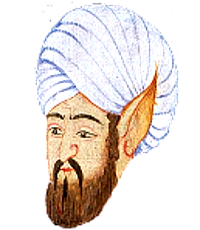Ibn Rushd and the challenge of reason
Ibn Rushd, also known as “Averroes,” was a scholar and a philosopher born in Córdoba in al-Andalus in 1126 CE. He is famous for his detailed commentaries on Aristotle, whose work he strongly defended against those who regarded him as an infidel. Ibn Rushd, that is, defended reason against revelation. Or rather, he regarded revelation, as presented in the Quran, as knowledge suitable above all for the illiterate masses. Ordinary people are literal-minded and they need miracles in order to believe. Miracles do indeed happen, Ibn Rushd argued, but they must always correspond to the laws which govern the universe. If not, the universe will become arbitrary and unintelligible.
The works of Ibn Rushd came to have a far-reaching influence on intellectual developments in Europe, in particular on Thomas Aquinas. Aquinas, the Church Father whose Summa theologica laid the foundations for all theological debates in the Middle Ages, asked himself the very same questions as Ibn Rushd. He too wanted to know how to reconcile reason with revelation. Aquinas too was a great fan of Aristotole, and although he disagreed with many of Ibn Rushd’s specific arguments, his general conclusions were basically the same. Aquinas always referred to Ibn Rushd with the greatest respect, calling him “the Commentator,” much as he called Aristotle “the Philosopher.”
The seminal contribution which Ibn Rushd made to the intellectual development of Europe had no counterpart in the Muslim world itself. Here Ibn Rushd left no school and no disciples, and his works were barely read. It was instead only at the end of the nineteenth-century that he was rediscovered. The immediate reason was a book by the French Orientalist Ernest Renan, Averroës et l’Averroïsme, 1852, in which Renan made a strong case for Ibn Rushd’s importance. Translating Renan’s book into Arabic, Muslim intellectuals discovered exactly what they had been looking for – a Arab who had made a seminal contribution not only to Arabic civilization but to the civilization of the world. To some contemporary Muslim intellectuals, the work of Ibn Rushd has become a symbol of a rationalistic intellectual tradition, in tune with modern society, liberalism and a scientific outlook on life.

